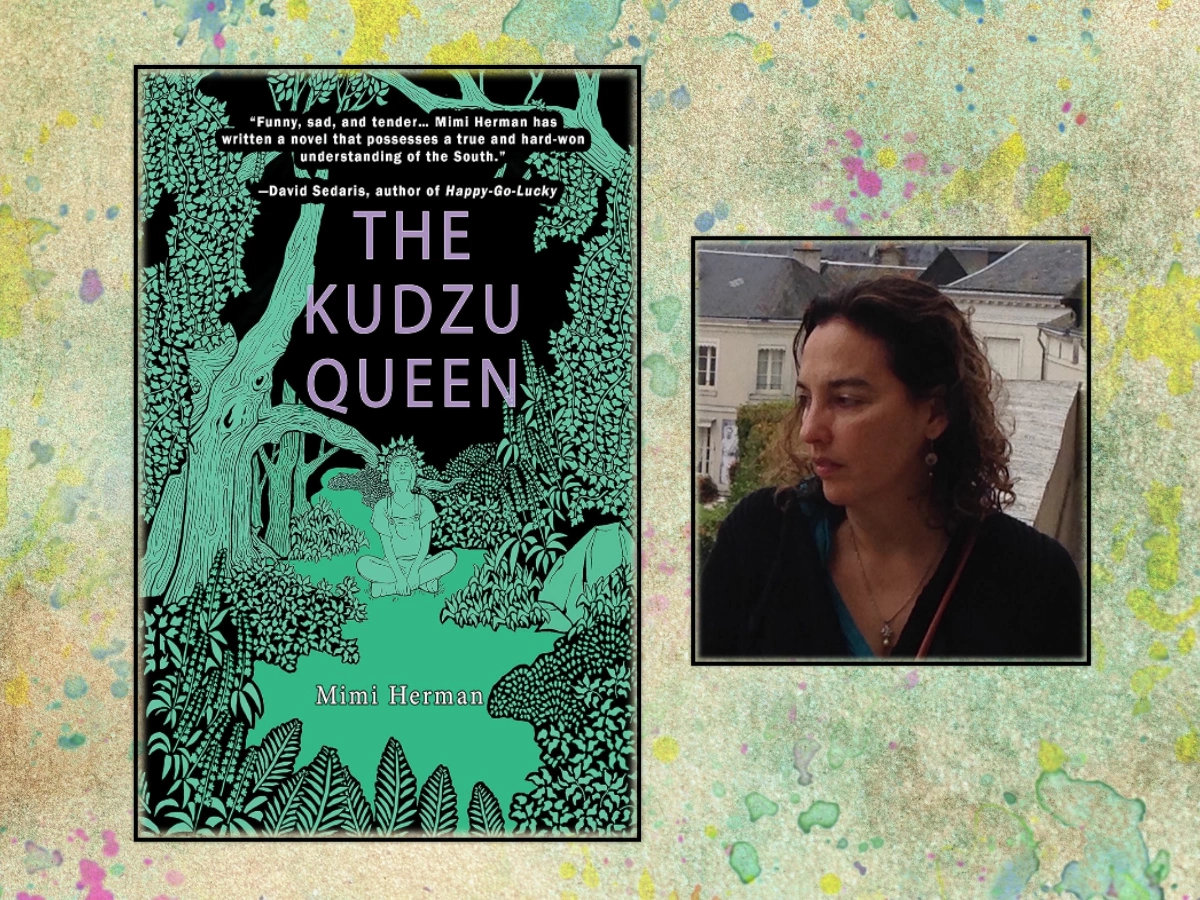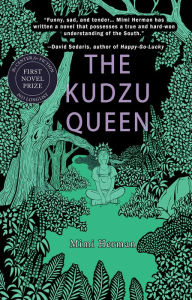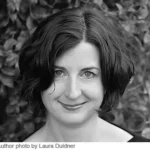LitStack’s Guest Review of Debut Novel The Kudzu Queen
Exploring a Complex Southern History
Kudzu—the invasive weed that overtook the South, choking houses, fields, and roadsides in a gothic green curtain of vines—is as atmospheric as a plant can be. Its image has been used to evoke a languid defeat, rooted in racism and poverty. And yet, the myths of kudzu obscure a complex history and present. Mimi Herman’s insightful debut novel, The Kudzu Queen, explores the plant’s emergence—and a community’s strengths and vulnerabilities—through the eyes of a vividly engaging fifteen-year-old narrator, Mattie Watson.
A Magnetic Charmer Rolls into Town
Set in 1941, in small town North Carolina, The Kudzu Queen opens with the cinematic arrival of the self-described Kudzu King, James T. Cullowee. Rolling into town in a shiny green truck, Cullowee touts kudzu’s benefits and promotes the government’s financial incentives to entice farmers to plant it (this is true: the U.S. government heavily marketed kudzu as a tool for erosion control).
A magnetic charmer with a green tie to match his truck, Cullowee’s splashy entrance announces a notable addition to the long lineage of con men in literature. He swiftly dazzles a gullible populace, distributing kudzu clippings and enlisting town leaders and children alike in his plan for a kudzu festival and beauty pageant.
We watched him drive down Main Street, the crowd parting to let him pass. As his truck diminished in the distance, even the dust that rose behind him seemed magical, lightly tinged with green and gleaming with hope.
The Kudzu Queen by Mimi Herman
An Unforgettable Teenage Narrator
A long-time North Carolinian, Herman anchors this coming-of-age story in a deep knowledge of the region. (Disclosure: Herman and I attended the same graduate program at different times, and became friends at an alumni conference). Her understanding of the place is matched by her astute insights about teenage girls.
Mattie’s voice leaps from the page: funny, precocious, and, at times, pierced with longing. Here she recalls meeting her best friend, Lynette Johnson, in seventh grade Home Economics class:
… the girls I’d thought were my friends had miraculously acquired both boyfriends and breasts over the summer—though I’m not sure in which order—and couldn’t be bothered with an old flat-chest like me any more. So there I was: friendless, confused, irritated …. At that moment, three things happened: the oven door on Number 19 fell open, hitting me sharply on the knee; an anonymous boy, rushing past the classroom window, which had been raised in the frail hope that a cool breeze might chance by, paused in his passage and let a huge fart …; and Lynnette Johnson—soft, skinny, with wispy pale brown hair and green eyes, strewing apologies like milkweed—flustered into class, came to a halt beside the only partnerless person in the room, and closed the oven door.
The Kudzu Queen by Mimi Herman
Best Friends with Starkly Diverging Lives
Now sophomores in high school, Mattie and Lynette are inseparable, though their home lives couldn’t be more different. Mattie is undeniably advantaged, the daughter of stable, loving parents who own their farm and the nearby land occupied by Lynette’s downtrodden family. Mattie dreams of becoming a lawyer, while Lynette’s future hopes are held in check, her prospects dimmed by a ne’er-do-well tenant farmer father and a wan, ailing mother:
Lynette’s house rose up forbiddingly in the dusk, gray paint peeling from the clapboard siding in wide curls, exposing wood almost as gray. Where the second story of our house rested neatly on the first, the Johnsons’ seemed to lean like an old dog that wanted to lie down and sleep.
The Kudzu Queen by Mimi Herman
(The houses throughout the novel are beautifully evocative characters in their own right).
An Exploration of Adolescent Longing
Smitten by Cullowee—and determined to win the Kudzu Queen competition—Mattie embarks on a campaign to gain the crown and the attention of her crush. Conspiring with her younger brother, she plants a field of kudzu on the property of their late aunt. She attends a “Queen School” for pageant contestants hosted by the Mayor’s wife, which gives Herman ample room to play with the particular rituals and constraints of 1940s girlhood, to hilarious effect.
Her pursuit gives Mattie an opportunity to try on versions of femininity and adulthood like costumes: “We sorted ourselves out by our natures, with the brave and conceited in the first group and those who wanted to get it over with in the next.”
Mattie is both innocent and sharp, a terrific reader of others’ motivations and prone to romantic projections, a devoted, clear-sighted friend and a sheltered child of privilege. In short, she’s a heroine with contradictions and depth. Herman charts Mattie’s hard-won maturation over the course of one eventful summer, and imbues the novel with verve and heart.
Adolescent longing is given its due, as Mattie moves from awe-struck infatuation, to guarded attraction, to an outright rejection of Cullowee, who emerges as a predator and an opportunist in more ways than one. After a near-miss of an assault: “I didn’t know why I was crying—for finally getting what I wanted or not wanting what I’d gotten—but I couldn’t stop for the longest time.”
More than Meets the Eye
Mattie’s growing sense that people are more than meets the eye extends closer to home. The reappearance of her childhood friend Rose Moore, a Black neighbor who possesses “a whole world of private” and is a contestant in a segregated kudzu pageant, counters the white rituals in the Mayor’s parlor. Mattie’s relationships with her family take dips and turns as well, and our understanding of each character deepens.
Despite Mattie’s longing for romantic love, the relationship at the heart of this novel is between the best friends (in this, too, Herman is an astute observer of teenage girls). Her friendship with Lynette, who bears some of the novel’s heaviest burdens, is tested in a crucible of dramatic losses. Mattie comes to understand that for all her friend’s sweetness, Lynette’s difficulties have given her a strength and forbearance that Mattie has only begun to grasp.
After Lynette makes an incisive comment about her drunken father, Mattie notes, “I’d never heard her speak that way, but it was such an accurate description that I wondered if she’d always seen him that clearly and for reasons of her own not said it out loud.”
A Community on the Cusp
The novel’s plot clips along and the stakes ratchet up, yet Herman never rushes the reader. With a light touch, we’re reminded that this small town is on the cusp of huge change—wrought not by kudzu but by America’s entrance into World War II. In Rose’s forthright calling out of injustice in conversation with Mattie, we see the seeds of the civil rights movement that will roil the South a generation later.
As the Kudzu Queen competition draws near, Mattie’s discovery of the extent of Cullowee’s duplicity sets the stage for a beauty pageant for the ages. The pageant brings the whole town together in an extended scene that ranges from riotously funny (a microphone acts like “truth serum” on the jittery contestants), to suspenseful, to deeply moving.
Mysteries at the Heart of Growing Up
Mattie’s journey is both highly specific and universal. Who doesn’t remember that first moment of youthful revelation, when we gain just enough perspective to begin to see the subtexts underlying the textures of our daily lives? For Mattie, for all of us, with that knowledge comes sadness, and joy, and a newfound sense of mystery.
This was a disturbing thought to ponder, that my mother had a secret life that I knew nothing about. Maybe everyone had secret lives other people knew nothing about. Maybe our lives were the stems and leaves and flowers of things, and there were whole underground root systems that people kept secret from one another.
The Kudzu Queen by Mimi Herman
Through Mattie’s indelible voice, these deep-rooted human mysteries—with all their unforeseen perils and transformative possibilities—receive the depth of attention they deserve. The Kudzu Queen delivers a riveting tale about a town and its inhabitants, but its fundamental power is rooted in wisdom about the complex, shifting terrain of adolescent girlhood.
~ Genanne Walsh
About Mimi Herman, Author of The Kudzu Queen
Mimi Herman is the author of The Kudzu Queen, Logophilia and A Field Guide to Human Emotions. Her writing has appeared in Michigan Quarterly Review, Shenandoah, Crab Orchard Review, The Hollins Critic, Prime Number, and other journals. She has performed her fiction and poetry at Why There are Words, Symphony Space, and Raleigh Memorial Auditorium.
Mimi is a member of the Association of Writers & Writing Programs Board of Directors, a Warren Wilson MFA alumna, a Kennedy Center Teaching Artist and a Hermitage Artist Retreat Fellow. She co-directs Writeaways writing workshops in France, Italy, Ireland, New Mexico and online.
You can find out more about her at https://www.mimiherman.com/ and www.writeaways.com. You can also find and follow Mimi on Instagram, Facebook, and LinkedIn.
Other Titles by Mimi Herman
About Genanne Walsh, the Reviewer
Genanne Walsh’s debut novel, Twister, was awarded the Big Moose Prize from Black Lawrence Press; her creative nonfiction chapbook, Eggs in Purgatory, was a finalist in the WTAW Press Alcove Chapbook Series Open and published in spring 2023. Her work has appeared in Puerto del Sol, Blackbird, McSweeney’s Internet Tendency, and elsewhere, and has been twice nominated for the Pushcart Prize. After thirty years in San Francisco, she recently moved to Portland, Maine with her wife and dog. She’s at work on a new novel.
Other Titles by Genanne Walsh
Other LitStack Resources
Be sure and check out other LitStack Reviews to find books you should read.
As a Bookshop, Barnes & Noble, and Amazon affiliate, LitStack may earn a commission at no cost to you when you purchase products through our affiliate links.





